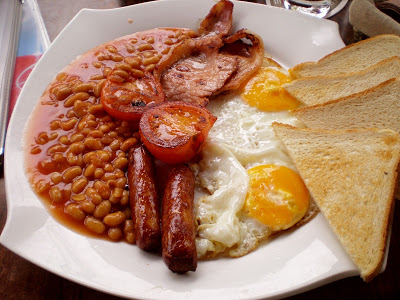An English Breakfast Causes Less Indigestion than the British Brexit
 Brexit always promised to be a thorny problem. It would be a daunting task under ideal circumstances, and conditions are far from ideal.
Brexit always promised to be a thorny problem. It would be a daunting task under ideal circumstances, and conditions are far from ideal.
The situation has become more complex in recent days. First, the High Court ruled that even though Parliament had approved the referendum, its authorization is needed again totrigger Article 50, which properly begins the divorce proceedings.
May's government is engaged in a two-prong response. First, it is appealing the High Court decision. Reports suggest that privately, many ministers expect to lose the appeal. The Supreme Court is expected to hear the appeal early next month. Second, there are reports that a bill is being drafted for Parliament to approve. May has indicated a strong desire to trigger Article 50 by the end of Q1.
While the Tories enjoy a small majority in Parliament, the general sense is that the MPs are less sympathetic to Brexit than the nation. The Tories are split. Although Labor leader Corbyn wrote a page op-ed in favor ofremaining, he has historically been hostile to the EU and, seemingly, made a halfhearted effort to rally support for the remaincamp.
Yesterday, Corbyn reportedly indicated that he would instruct Labour MPs to vote against triggering Article 50 unless access to the single market can be guaranteed. The Brexit camp and many outspoken Tory MPs have placed emphasis on limiting immigration rather than preserving access to the single market. May herself has said that regaining control of its borders, something she apparently struggled to do as Home Secretary (a slim majority of UK immigrants come from non-EU countries) even though the UK is not a member of the Schengen Agreement.
One way or the other, May will have to reveal more of her Brexit plans. Even if the Supreme Court overturns the High Court verdict, the Prime Minister will want to share her broad objectives, perhaps before the end of the year. The rivalry between Brexit Minister Davis and Chancellor of the Exchequer Hammond has been put aside, and a common plan to defend the financial sector (City of London) interest has been devised.
There is a growing sense of urgency. The head of the British Bankers' Association said recently that banks could start moving operations out of London within weeks, with many small banks starting to relocate before the end of the year. There appears to be a gradual recognition that UK banks and insurers will likely lose "passporting" rights that permit them to sell their services throughout the EU provided the UK "equivalence" with EU regulations.
The fear is that "equivalence" is not a secure enough foundation for businesses. The UK would be forced to still adopt Brussels rules, without UK input, or "passporting" privileges would be lost. And it could happen quickly, say within a month. An EU review is currently underway on streamlining and strengthening the current equivalency rules.
If Parliament votes down the legislation necessary to trigger Article 50, May reportedly will consider calling for a general election. Up until now, May has denied interest in this course. Also, the changing electoral laws make it a little difficult to do so with her slim majority. Labour, which would likely get shellacked, has little interest in early elections
Even in an election that the Conservatives would likely win, it might not work in May's interest. Which wing of the Tory Party would come on top? The one that thinks that immigration is the biggest challenge or those that want to maintain access to the common market. The former is understood to be a hard Brexit, while the latter suggests greater continuity in a Swiss-like arrangement.
Simply put, May comes from a different wing of the Tories that Cameron and Osborne. In numerous areas,she has moved distanced herself from the former Prime Minister. However, she arguably compounded Cameron's folly by repeating it: Brexit means Brexit, she said ad nausea. A different leader could have said. "Look, Cameron improperly tied himself to the mast. He insisted on treating the non-binding referendum as if it were something else, binding. This is an injustice." She could have argued that the narrowness of the outcome (less than two percentage points) was insufficient for such a momentous decision.
Rather than spur a constitutional crisis, May could have left it in Parliament's hands to being, knowing full well that as a body, it was less sympathetic with the hard Brexit priorities. She arguably is acting like the Home Secretary rather than proving the strong leadership the country needs. Some of the costs of the referendum are already being born in terms of the sterling's drop and the resumption of asset purchases, the forgoing efforts to reduce the country's debt, and the loss of the EU rotating presidency senior EU commissioner portfolio. Many in the Brexit camp see the resilience of the UK economy as proof that the Remainers had exaggerated the negative economic impact. This too may prove illusory. The significant drop sterling will alter the terms of trade and facilitate a restructuring of the UK economy.
The weekend press warned that several imported brands of consumer goods were raising prices in the UK. The Financial Times noted that Walkers crisps and Birds Eye frozen food's wouldjoin Unilever's and rise prices. Walkers cited the exchange rates for lifting prices by 10%. It claimed that imported items such as seasonings, frying oil and packaging film prices were rising.
The FT quoted the company spokesperson: "Fluctuating foreign exchange rates, supply pressure on key ingredients and the weakened value of the pound are impacted the import cost of some of our materials and affecting theprice of material costs based on commodities that are traded in foreign currencies." Birds Eye, a provider of frozen vegetables, fish and chicken said it is considering a 12% price increaseand may reduce the size of some servings to compensate for the decline in sterling.
There are two observations that are worth sharing. First, the price increases are thus far limited to consumer goods. Second, the companies that are raising prices are from Anglo-American countries. Companies in these countries rely more on markets to provide capital than banks. The access to impatient capital makes them more likely to pass exchange rate shocks on to customers. It is important that profit margins are protected. That is what their cost of capital depends on. Companies from other countries, typically continental European and Japanese companies rely more on patient bank capital. They are more likely to accept narrower profit margins to maintain market share; their key to long-term access to capital.
This post was originally published by Marc Chandler at his blog, marctomarket.com
Copyright © Marc Chandler















